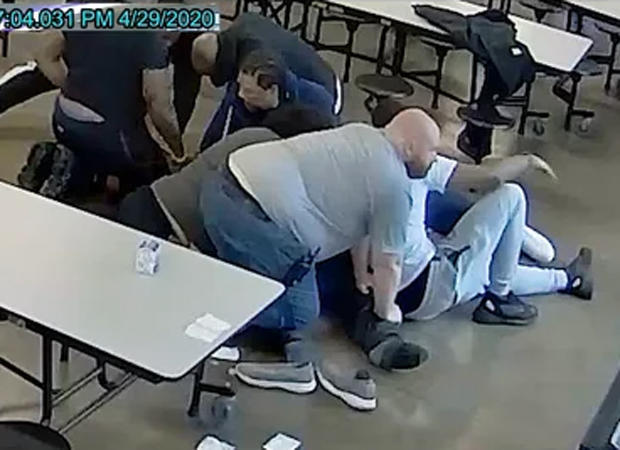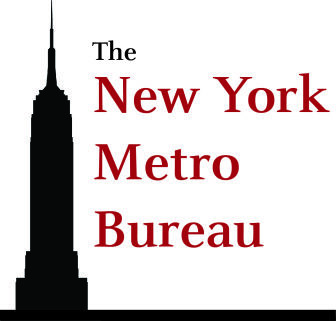
Geoffrey Fieger
In video released by family attorney, Cornelius Fredericks is restrained for throwing food. He later died.
NEW YORK — Cornelius Fredericks, 16, was sitting at a table eating lunch when he was tackled by a staff member at Lakeside Academy in Kalamazoo, Michigan. Soon after he hit the ground, two other staff members ran over to assist. They started restraining Fredericks for throwing food. The teen remained restrained for 12 minutes.
It would be the last minutes of his life. Fredericks died after going into cardiac arrest.
The abrupt outburst is captured on a video released by the Michigan Department of Health and Human Services. It shows the two staff members applying pressure to Fredericks’ upper torso. After they get off him, someone begins to give him CPR. A table is moved to make room. A small crowd gathers.
After an investigation of Lakeside Academy, Michigan Gov. Gretchen Whitmer revoked the facility’s license and prohibited the use of all physical restraints in all of Michigan’s licensed child care facilities. The Legal Aid Society is now calling for Gov. Andrew Cuomo and the Office of Children and Family Services (OCFS) to do the same in New York.
Children living in residential treatment centers (RTCs) face a similar threat of death or serious injury at the hands of staff, the organization’s letter to Cuomo and OCFS Commissioner Sheila Poole says. Children in foster care placed in these facilities, which are overseen by OCFS, are subject to “prone” or face-down restraints like the one that resulted in Fredericks’ death.
“In April, 2019, a developmentally delayed New York City foster child in an RTC suffered devastating and catastrophic injuries, including quadriplegia, after reportedly being subjected to a prone restraint,” the letter says.
The Administration for Children’s Services did not specifically comment on the letter or ending their use of the restraint.
 “The safety and well-being of New York City youth in residential treatment centers is our top priority,” an ACS spokesperson said. “We appreciate the opportunity to engage in conversations with OCFS and Legal Aid about ways to further ensure the safety of children in care across New York State.”
“The safety and well-being of New York City youth in residential treatment centers is our top priority,” an ACS spokesperson said. “We appreciate the opportunity to engage in conversations with OCFS and Legal Aid about ways to further ensure the safety of children in care across New York State.”
Legal Aid listed other incidents that have occurred at OCFS-run facilities. In 2012, a 16-year-old boy with special needs died after being restrained by four staff members. In 2006, a young teen named Darryl Thompson from the Bronx died after being restrained on the bathroom floor at an OCFS-operated juvenile justice facility.
“OCFS specifically permits RTCs it is responsible for licensing to use prone restraints, even though such restraints are more likely to result in serious harm or death than other types of restraint,” Legal Aid’s letter read.
OCFS declined to comment on both the incidents and the letter.
The U.S. Department of Justice (DOJ) investigated OCFS’ facilities for its unlawful use of restraints in 2009 and said that prone restraints restrict the individual’s airway, meaning they are unable to express distress. Distress may be misconstrued as resistance, resulting in increased force used.
The findings letter from the Justice Department referenced the 2006 incident at Tryon Residential Center for Boys, where a prone restraint was used. Thompson’s death was ruled a homicide by the medical examiner but a grand jury later declined to indict any of the workers involved.
“Despite this tragic death, a dangerous combination of high rates of prone restraints and a low standard for initiating a restraint remains at the facilities,” read the DOJ 2009 findings letter.
Tryon Residential Center closed in January 2011. In 2009, the Department of Justice found that the civil rights of juveniles at Tryon and other New York State juvenile centers were being violated: They weren’t getting proper mental health treatment and staff used force inappropriately.
Lisa Freeman, director of the special litigation and law reform unit at Legal Aid, said these residential facilities exist around the state.
“They are operated by nonprofit agencies,” she said. “We are particularly concerned about the ones where our clients are housed. ACS contracts with these agencies to house youth in foster care in these RTCs.”
These restraints are prohibited in virtually every other residential child care facilities because they cause serious harm or death, Dawne Mitchell, attorney-in-charge of the juvenile rights practice at The Legal Aid Society, wrote in the letter.
“For children placed in RTCs, the trauma of removal from their families is then compounded by the trauma of being subjected to brutal and dangerous restraint practices,” Mitchell said.